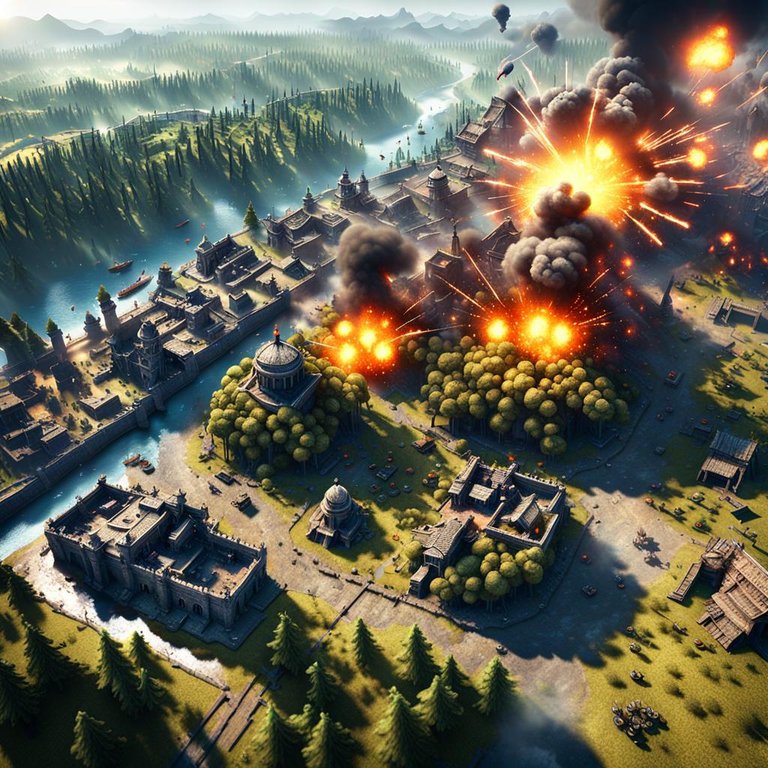Creating a Narrative Wargames Campaign - Part 1: What is a Narrative Campaign ?
This post is the first in a short series sparked by a conversation between myself and @zakludick. It relates to setting up a narrative campaign for a wargame.
I originally started out just writing this as a single post, but once I started writing down the headings for all the different topics the idea covers, I rapidly realised that it needed a short series to do justice to the concept.
In the series, I'm not going to write up a set of fixed "rules" for setting up a narrative campaign. Rather, I'm going to highlight a number of topics which can be discussed with your friends as you set one up. There are no "right answers", it's just a case of thinking about what you want your game to be like. Then creating a structure which is fun to play and minimises the inevitable issues that can arise.

Image created by AI in NightCafe Studio

Warning !
Narrative campaigns can easily become monsters.
It's very easy (and often enjoyable) to get really engrossed on the details. Some players really get into creating alternative histories, writing up biographies for their characters, developing interesting and unique economic and cultural backgrounds for whichever nation, empire or society they are playing as.
This is fine if it stays in the realm of private side-projects. If people are just adding "fluff" to their game lore, it's a wonderful way to improve immersion. It also improves the prospect of success if you want the game to turn into a long-term thing.
But if you allow these details to impinge too much on the immediate gameplay, there's a significant risk that the whole thing can rapidly bog down into an administrative nightmare. After all, we are a few people who are trying to create a rough playable approximation of a country, a world or a universe with potentially millions or billions of inhabitants. We can't simulate them all individually !

What even is a narrative campaign ?
A narrative campaign is a way to game that's a blend of wargaming, simulation, storytelling and roleplaying. The balance between those elements can vary tremendously depending entirely on what the players want.
In the real world, history is a mix of economic, social, political and diplomatic events and factors. Wars happen once other methods of negotiation or decision making have failed. As Clausewitz said, "War is the continuation of diplomacy by other means".
A wargame with a narrative campaign reflects this. It includes some other factors, e.g. diplomacy, economic production, roles for key characters etc. What it isn't (although some of the longer-running ones have got terrifyingly close to it...) is a complete world simulation.
Narrative campaigns come in all kinds of scope and flavour. At the simplest end, they add a simplified economic and diplomatic angle to link a series of tabletop wargames. The opposite end of the spectrum is probably a fully-featured RPG setting for something like Dungeons & Dragons, where the roleplaying aspects are dominant and actual battles become little more than a scenic backdrop.
The number, availability and play style of players is a key factor when it comes to designing your campaign.
If you've got a few ruthless competitive players who are only likely to be interested or available for a short while, you are probably better off designing a short campaign with clear victory conditions
On the other hand, if you've got a core group of players who are available and interested for the long term, and who (at least mostly) are less competitive and play for the joy of creating a good story, then you may be able to create a long-running open ended campaign which is structured so that players can join or drop out during the game.
Over the years I've played in and run quite a variety of narrative campaigns. In terms of timescale they've run from games played over a weekend with a fixed end-point, to long-running games that have lasted (often with many changes along the way) for years. I guess the longest running is my homebrew D&D setting, which definitely has strong political-military elements, which has been going on and off for around 45 years. Quite a few games have had just two or three players, but one game (called "The World Game") had each country represented by a whole wargaming club spread across the whole of the south of England - several hundred players in total.
So as you can see, there's a lot of scope for variety - no two games are quite the same !

Next post: Open vs Closed campaigns
Congratulations @alonicus! You have completed the following achievement on the Hive blockchain And have been rewarded with New badge(s)
You can view your badges on your board and compare yourself to others in the Ranking
If you no longer want to receive notifications, reply to this comment with the word
STOPCheck out our last posts:
This is bloody inspiring! I want to do a Warhammer 40k Campaign!
You have a lot of experience @alonicus! I think I should start something small...
Thank you ! Yep, starting with a small game first is a good way to go - I think most of the long-running games started off as a short game that the players enjoyed enough that they agreed to keep it going 😀
Awesome
I am so looking forward to it!